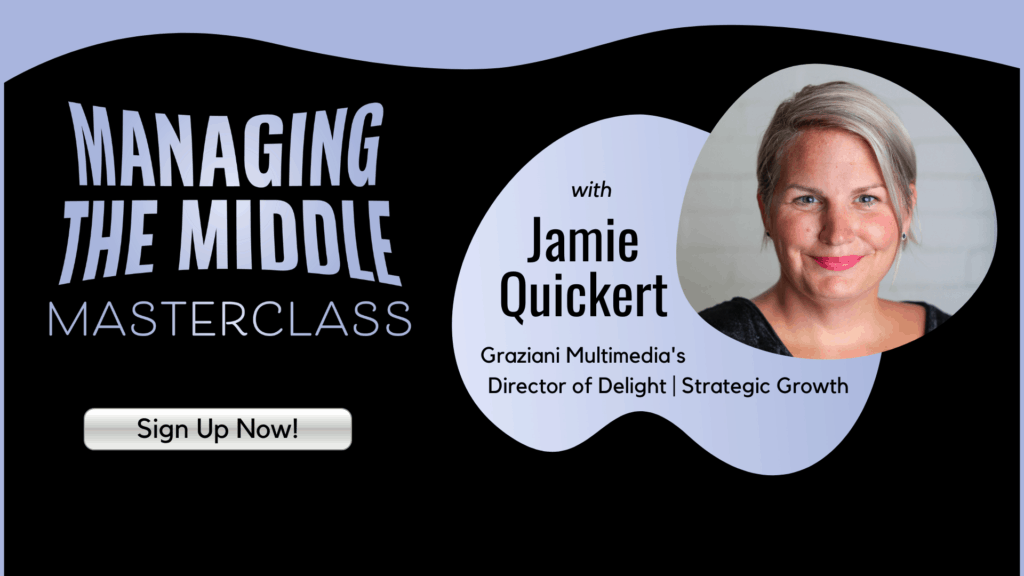I have written about “managing down” to the employees you lead, “managing up” to your boss or the CEO, and today I thought I would tackle the hardest topic of all, managing across the aisle.
Let’s be honest, managing the middle is exhausting, and managing relationships with colleagues and peers in other departments is the worst.
Why? Well, if we are honest it is because many of us are competitive. And more so, many of us are petty. Don’t get me wrong, we don’t mean to be, but we value our departments and understand the contributions we are making to the team. It can be hard to understand the contributions other are making. Often it seems like our goals are not aligned.
This isn’t an industry-specific problem. Ask anyone in hospitality how the back of the house teams feel about the front of the house team. Ask anyone in a large corporation how the sales and marketing teams get along. Ask anyone working in a nonprofit how those who are actually meeting with clients feel about those who are meeting with donors or ask anyone on a line in a factory how they feel about those with desk jobs. Chances are high you will walk away with a handful of us versus them stories and more than a few digs at others who are seen more as competitors than colleagues.
I won’t even tell you how many times the chef and I got into yelling matches in the freezer as we worked through our differences and fought for our teams when I worked in hospitality. Nor will I tell you about the time I cried in the bathroom at work even though I was the Director of Sales for a major company because the Director of Marketing made me feel foolish and unheard and small. Managing the middle is the worst. But it doesn’t have to be that way. It shouldn’t be that way. Building trust and respect between teams and among colleagues is crucial for the success of any business.
In fact, 70% of employees say having friends at their job is the most crucial element to a happy working life. When asked to choose two emotions they feel when excluded at work, 40% of respondents across generations and genders said they’re most likely to feel ignored.
The bottom-line peer relationship matter to both our professional and personal well-being and happiness. I know this from my own experience. It has taken some time, but I haven’t had to yell in a freezer or cry in the bathroom in a long time.
Here are some strategies I learned to manage the middle.
- Understand that you are all fighting for the same team. The biggest advice I can give to those who are trying to understand and connect with other departments and colleagues is to truly understand that the success of the business takes all teams working together effectively in each of their roles. No two contributions are the same, but each of those contributions are what causes the business to run. Marketing needs sales to sell in order to pay the bills. Sales needs marketing to bring in clients. The back of the house needs the front of the house to serve the food they make. The front of the house has nothing to serve if the back of the house doesn’t make it. The examples of this go on and on and on. When you understand and begin to value the contributions each member is making and that you are all fighting for the same team, it becomes easier to connect and collaborate.
- Connect beyond your task list. Small talk matters. But not just small talk. Get to know your colleagues personally. Are they married or single? Do they have kids or pets? What are their hobbies? Where do they vacation? What do they do for fun or on the weekend? What makes them laugh? What are they passionate about? What sports team do they love? Find something you have in common and connect with your colleagues over it. People want to be known, and taking time to get to know others it will strengthen your bonds professionally and personally.
- Build trust. Trust is a critical factor for any relationship. Loyalty matters. People watch how you treat others, and more so, they watch how you treat others when they are not around. Are you the office gossip? Do you always talk negatively about your job, your boss, or other colleagues? While they may not say it directly, people want to feel safe within a relationship. Being someone that others can count on professional and personally matters.
- Praise often. Recognize contributions. Who doesn’t like a genuine compliment? Studies have shown our brain processes a true compliment in the same way it processes a cash reward, and yet 40% of employees say they are not recognized enough at work. Do not wait for the boss to give praise, but speak up the next time you see someone doing stellar, taking one for the team, or going above and beyond. Not only will it do wonders for your relationship with that colleague, but it will also improve the morale of the entire team
- Be a good human. I have ended most of my lists with this point, but it bears repeating over and over. Be a good human. It takes no talent or special skill to be on time, bring a good attitude to work, put energy and enthusiasm into what you do, support your colleagues, ask questions when you don’t know the answers, and be willing to work hard. Learn from those around you. Be empathetic. Be flexible. Be loyal. Participate in office activities, even if that means wearing a costume on Halloween or showing up for that Happy Hour after a long day of work. Buy the girl scout cookies. Invest in those around you. Show them that they matter to you inside and outside of the office, and I promise your relationships will change.
Mine did. That chef that yelled in the cooler at me is one of my greatest friends. We have so many amazing stories from business trips around the country and so many memories from times spent together inside and outside of work. The Marketing Director who made me cry still checks in on me via Social Media and often cheers me on and reminds me she is one of my biggest fans. The smallest steps make the biggest difference in learning to truly manage the middle.




